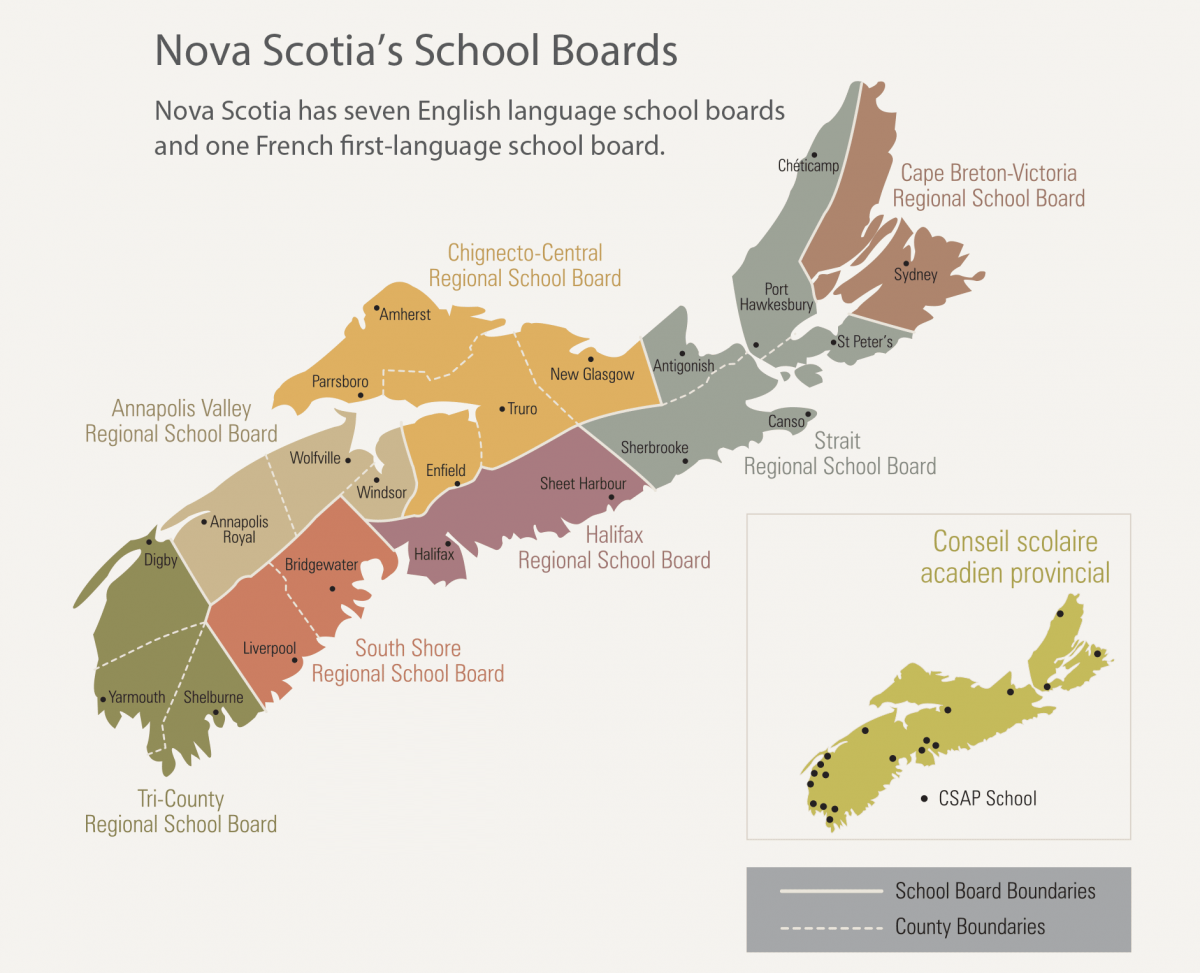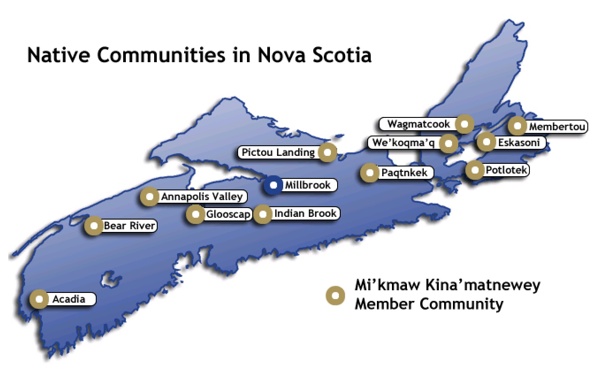Nova Scotia Overview
Regional Centres
Regional Centres in Nova Scotia
There were 118,962 students enrolled in 372 public schools in Nova Scotia in the 2017-18 school year (see source 1). The schools are divided into 7 regional centres and 1 provincial Acadian school board (CSAP). Each regional centre has an executive director who is responsible and accountable for student success, education programming and policies. The directors oversee the regional education centres and report to the Deputy Minister of Education and Early Childhood Development.
Regional Websites
Conseil scolaire acadien provincial (CSAP)
CSAP is governed by a School Board composed of 18 elected board members representing the ten regions where the 22 CSAP schools are located. To attend a CSAP school, priority is given to children of parents whose first language is French, and for whom minority language education rights apply, as specified under Section 23 of the Canadian Charter of Rights and Freedoms. Eligibility to enroll children from families whose first language is not French is assessed on a case by case basis. For more information on admission criteria, please refer to the CSAP website.
Supporting Diversity in the Schools
Each regional centre in Nova Scotia has a position called the Race Relations, Cross Cultural Understanding and Human Rights Coordinator (RCH). The purpose of this role is to provide supports in schools for students of African Nova Scotian and/or First Nations/Mi\'kmaq ancestry. This is done with the help of the Student Support Workers and school support liaisons. RCH coordinators support students and work to raise awareness of the diversity within the region throughout the year and within all schools.
What is Mi\'kmaw Kina\'matnewey (MK)
Mi\'kmaw Kina\'matnewey is a unified group of chiefs, staff, parents and educators which represents the educational interests of Mi\'kmaw communities, and protects their language and educational rights. MK is responsible for on-reserve band-operated schools and education across the province.
The vision of MK is as follows:
Our people have a common opportunity that provides the best possible educational experience such that our students achieve the highest standards in Canada in the broadest sense, and they are comprehensively prepared for their chosen next steps after high school. The education is provided in a way that our language, culture, and traditions are fostered in their lives thereafter and embedded in their character. We will achieve these goals in both our community as well as in provincial schools.
The member communities are:
- Acadia Mi'kmaw Nation
- Annapolis Valley Mi'kmaw Nation
- Bear River Mi'kmaw Nation
- Eskasoni Mi'kmaw Nation (Eskasoni Elementary and Middle School, Chief Allison M. Bernard Memorial High School)
- Glooscap Mi'kmaw Nation
- Membertou Mi'kmaw Nation (Membertou Elementary School)
- Paqtnkek Mi'kmaw Nation
- Pictou Landing Mi'kmaw Nation (Pictou Landing Elementary School)
- Potlotek Mi'kmaw Nation (Mi'kmawey Kina'muokuom)
- Shubenacadie Mi'kmaw Nation (L'nu Sipuk Kina'muokuom)
- Wagmatcook Mi'kmaw Nation (Wagmatcookewey Mi'kmaw School)
- We'koqma'q Mi'kmaw Nation (We'koqma'q Mi'kmaw School)
The First Nation School Success Program
Below is a sample of a MK initiative.
The First Nation School Success Program (FNSSP) is an MK initiative which has been funded through Indigenous Services Canada since 2009. The program supports activities in First Nation communities aimed at increasing students' achievement levels in reading and writing (English and Mi\'kmaw literacy) and mathematics (numeracy). The FNSSP also encourages students to remain in school (student retention).
The activities funded under FNSSP are required to include three components: School Success Plans, Student Learning Assessments, and Performance Measurement Systems. Mi\'kmaw Kina\'matnewey consultants work with educators in band-operated First Nation Schools to develop plans and systems, as well as gather student information such as assessment results. That information is then used to guide instruction to increase student success. By working directly with communities, MK FNSSP is able to take a focused approach, target particular areas for attention and provide the special services needed to increase student and school success.
What information is provided on regional centres\' websites?
Each regional centre and Conseil scolaire acadien provincial has a website. There are several common areas that each website covers for students, parents and the community. Here are samples of a few common sections.
1. Each website lists ministerial policies. Some common ministerial policies are:
- Food and Nutrition Policy for Nova Scotia Schools: Policy Directives and Guidelines
- Provincial Student Attendance and Engagement Policy
- Provincial Homework Policy (Grades P-12)
- Provincial Policy for Interviewing Children by Child Protection Social Workers in Public Schools
- Provincial Privacy of Student Information Policy
- Provincial School Code of Conduct Policy
- Provincial School Network Access and Use Policy
- Racial Equity
- School Fees
- School Review
- Special Education
- Student Records
Visit here for a full list of ministerial policies. (Read More 1)
Each website has its own pdf copy of the Long-Range Outlook. Nova Scotia's regional centres are required to share important information about their schools, and their education programs and services in a document called the Long-Range Outlook. The purpose of the Outlook is to help regional centres and school communities have more informed discussions about the future of their schools, and the programs and services they offer. Visit here for a sample on the Halifax Regional Education Office website. (See Source 7)
All schools in Nova Scotia have full access to iNSchool systems. iNSchool is a province-wide program focused on using technology to better support student achievement. PowerSchool is the part of the iNSchool system which manages core student information- such as demographics, attendance, behavior, achievement and schedules. With PowerSchool the province, regional centres, schools and the Department of Education and Early Childhood Development are well equipped to be more effective in the management of student data. Regional Centres and schools use PowerSchool to improve the educational experience for students and empower teachers and administrators to make more informed educational decisions to improve student academic achievement. (See Source 8)
Each website has a list of schools that are in that particular regional centre. Visit here to see the schools in the Conseil scolaire acadien provincial (an option comes up on the website to translate it into English). (Read More 2)
Each website has information on transportation. Visit here for an example of transportation information on the Annapolis Valley Regional Education Office website. (Read More 3)
6. Each website provides a school calendar. Visit here to see an example of the school calendar on the South Shore Regional Education Office website for 2017-2018. (Read More 4)
7. Most websites have an About Us section that provides some facts on when they were established; the number of students and schools in the regional centre; a mission statement, beliefs, goals and/or guiding principles; and the budget they work with. Visit here see an example of this on the Strait Regional Education Office website. (Read More 5)
Each website has separate sections for Students, Parents and Staff. Helpful information, forms, links and resources are provided. Visit here to see information for parents on the EXCEL program; a fee-for-service recreational program run by the Halifax Regional Education Office. (Read More 6) This program is currently offered in 62 elementary schools in that centre. It is an option for parents who are seeking before and after school care for their elementary-aged children. At each school site, the dedicated and qualified staffing teams plan weekly games and activities that suit the needs and interests of the students in the program.
Most websites have a section on News. Visit here to read the news on the Pictou Landing Elementary School. (Read More 7)
All websites have an Employment section that posts positions. Visit here for an example of this on the Cape Breton-Victoria Regional Education Office website. (Read More 8)
11. All websites have Social Media sites: Facebook, Twitter and Pinterest. Visit here to see some of these on the Tri-county Regional Education Office website. (Read More 9)
12. Most websites have information on School Advisory Councils (SACs). Visit here to read on these on the Chignecto-Central Regional Education Office website. (Read More 10)






